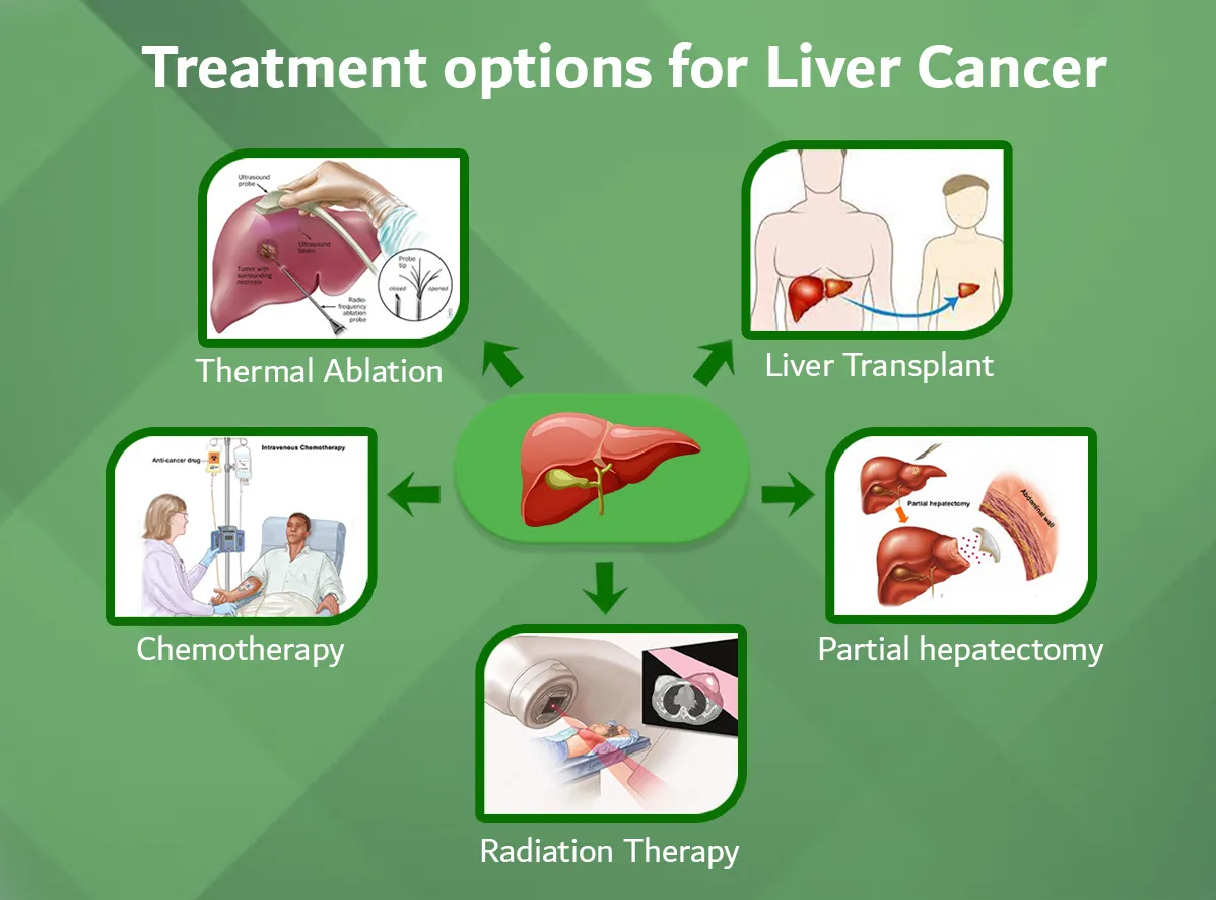Liver Cancer Treatment: Comprehensive Care for Hepatocellular Carcinoma and Other Liver Tumors
Liver cancer, also known as hepatocellular carcinoma (HCC), is a malignancy that starts in the liver cells. It is often linked to chronic liver diseases such as cirrhosis or hepatitis. Liver cancer can be aggressive, and early diagnosis is key to successful treatment. Healtour Solutions provides access to leading hospitals and specialists who offer advanced liver cancer treatment options to improve outcomes and quality of life.
Types of Liver Cancer
- Hepatocellular Carcinoma (HCC): The most common type of liver cancer, it originates in the liver cells.
- Cholangiocarcinoma (Bile Duct Cancer): Cancer that originates in the bile ducts, which carry bile from the liver to the gallbladder and intestines.
- Liver Metastases: Cancer that has spread to the liver from other parts of the body, such as the colon or breast.
Symptoms of Liver Cancer
Liver cancer often doesn’t present symptoms until the disease has advanced. Some common symptoms include:
- Abdominal pain, especially in the upper right side
- Unexplained weight loss
- Jaundice (yellowing of the skin and eyes)
- Loss of appetite
- Swelling in the abdomen (ascites)
- Nausea and vomiting
- Fatigue
If you experience any of these symptoms, it’s crucial to seek medical attention promptly. Early detection can significantly increase the chances of successful treatment.
Causes and Risk Factors of Liver Cancer
Liver cancer can develop in individuals with chronic liver conditions or those with other risk factors. Common causes and risk factors include:
- Chronic Hepatitis B or C Infection: Long-term viral infections can damage liver cells and increase the risk of cancer.
- Cirrhosis: Scarring of the liver tissue due to alcohol abuse, fatty liver disease, or chronic hepatitis can lead to liver cancer.
- Heavy Alcohol Consumption: Chronic alcohol abuse increases the risk of liver cirrhosis and liver cancer.
- Non-Alcoholic Fatty Liver Disease (NAFLD): In some cases, NAFLD can progress to cirrhosis and liver cancer.
- Aflatoxin Exposure: Aflatoxins are toxins produced by certain molds found in food such as peanuts, and long-term exposure may increase liver cancer risk.
- Obesity and Diabetes: These conditions can contribute to fatty liver disease, increasing the risk of liver cancer.
- Genetic Disorders: Conditions such as hemochromatosis (iron buildup in the body) and Wilson’s disease (copper buildup) can increase the risk of liver cancer.
Diagnosis of Liver Cancer
Liver cancer is diagnosed through a combination of medical imaging and laboratory tests. Common diagnostic steps include:
- Medical History and Physical Examination: Your doctor will ask about symptoms, medical history, and risk factors, followed by a physical exam.
- Blood Tests: Blood tests to measure liver function, liver enzymes, and tumor markers such as alpha-fetoprotein (AFP), which may be elevated in liver cancer.
- Imaging Studies:
- Ultrasound: Often the first imaging test to detect liver tumors.
- CT Scan (Computed Tomography): Provides detailed images of the liver and can detect tumors.
- MRI (Magnetic Resonance Imaging): Offers high-resolution images and helps in assessing the extent of the cancer.
- Biopsy: A liver biopsy may be performed to confirm cancer and determine its type and stage.
- Liver Function Tests: These help assess how well the liver is working and whether the cancer has affected liver function.
Treatment Options for Liver Cancer
Treatment for liver cancer depends on the size, location, and stage of the tumor, as well as the overall liver health of the patient. Common treatment options include:
- Surgery
- Liver Resection: Surgical removal of the tumor or part of the liver is possible if the cancer is confined to one area and the liver function is well-preserved.
- Liver Transplant: In cases where liver cancer is accompanied by cirrhosis or when the cancer cannot be removed by surgery, a liver transplant may be the best option.
- Local Treatments
- Ablation Therapy: This involves destroying cancer cells by applying heat (radiofrequency ablation) or cold (cryotherapy) directly to the tumor.
- Transarterial Chemoembolization (TACE): A procedure in which chemotherapy is delivered directly to the tumor through the hepatic artery, while the artery is blocked to stop the blood supply to the tumor.
- Transarterial Radioembolization (TARE): Similar to TACE, this treatment uses radiation to target and destroy liver cancer cells.
- Chemotherapy
- Systemic Chemotherapy: Chemotherapy drugs may be used to shrink or destroy cancer cells in the liver, but they are often less effective for liver cancer compared to other cancers.
- Targeted Therapy: Targeted therapies aim at specific molecules involved in the growth of cancer cells and may be used to treat advanced liver cancer.
- Immunotherapy: Immunotherapy drugs help the body’s immune system recognize and attack cancer cells.
- Radiation Therapy
- External Beam Radiation: This method involves delivering high-energy rays to the tumor from outside the body. It is typically used when surgery is not an option or in combination with other treatments.
- Palliative Care
- In cases where liver cancer is not treatable, palliative care focuses on relieving symptoms and improving the patient’s quality of life through pain management, nutritional support, and emotional care.
Role of Healtour Solutions in Liver Cancer Treatment
Healtour Solutions provides comprehensive support for liver cancer patients by connecting them with the best oncologists and hepatologists in India. Our services include:
- Personalized treatment plans tailored to the patient’s unique needs
- Access to world-class hospitals offering advanced liver cancer treatments
- Expert guidance throughout the diagnosis, treatment, and recovery phases
- Post-treatment support to monitor liver function and prevent recurrence
Why Choose Healtour Solutions for Liver Cancer Treatment in India?
- World-Class Medical Expertise: Healtour Solutions connects you with leading liver cancer specialists in India who offer advanced treatment options, including surgery, transplantation, and targeted therapies.
- Affordable and High-Quality Care: Treatment in India is significantly more affordable compared to many other countries, without compromising on the quality of care.
- Advanced Technology and Facilities: We partner with top hospitals in India that are equipped with the latest technology and expertise to offer the best possible outcomes for liver cancer treatment.
- Comprehensive Care: From diagnosis to post-treatment recovery, Healtour Solutions ensures that every aspect of your liver cancer journey is taken care of with compassion and professionalism.
Step-by-Step Guide to Liver Cancer Treatment
Step 1: Consultation and Diagnosis
- Meet with an oncologist to discuss symptoms.
- Undergo tests like blood work, ultrasound, CT scan, and biopsy.
Step 2: Personalized Treatment Plan
- Based on the diagnosis, your doctor will recommend surgery, chemotherapy, or a liver transplant.
Step 3: Treatment Options
- Surgery: Removing the tumor or liver transplant in advanced cases.
- Local Treatments: Ablation therapy or TACE/TARE for targeted treatment.
- Chemotherapy: Systemic drugs to shrink tumors.
- Radiation: Targeted radiation therapy for the liver.
Step 4: Post-Treatment Care
- Hospital stay for recovery and regular follow-ups.
Step 5: Long-Term Care
- Ongoing check-ups and lifestyle recommendations.
Step 6: Emotional Support
- Counseling and support for both patients and families.
Step 7: Ongoing Monitoring
- Regular tests to track recovery and prevent recurrence.
At Healtour Solutions, we provide expert, personalized care every step of the way for liver cancer treatment.
Contact Us for Liver Cancer Treatment
If you or a loved one has been diagnosed with liver cancer, Healtour Solutions can help you find the best possible treatment in India. Contact us today for a consultation and take the first step toward expert care and a personalized treatment plan.
FAQs About Liver Cancer Treatment
- What is liver cancer?
Liver cancer is a malignancy that originates in the liver cells and is most often associated with chronic liver diseases like cirrhosis and hepatitis.
- What are the symptoms of liver cancer?
Symptoms may include abdominal pain, jaundice, unexplained weight loss, and fatigue. However, many individuals may not experience symptoms in the early stages.
- How is liver cancer diagnosed?
Diagnosis involves a combination of blood tests, imaging studies (ultrasound, CT scan, MRI), and sometimes a liver biopsy to confirm the presence of cancer.
- What are the treatment options for liver cancer?
Treatment options include surgery (liver resection or liver transplant), ablation therapy, chemotherapy, targeted therapy, immunotherapy, and radiation therapy.
- Can liver cancer be cured?
Liver cancer can be treated effectively if diagnosed early. In some cases, liver transplant or surgical resection can cure the disease, but advanced liver cancer may require ongoing management.
- What is the survival rate for liver cancer?
The survival rate for liver cancer depends on the stage of the disease, overall health, and the type of treatment received. Early-stage liver cancer has a higher survival rate.
- Is liver transplant necessary for liver cancer treatment?
A liver transplant may be recommended for patients with advanced liver cancer or those who have liver cirrhosis alongside the cancer.
- What is the role of chemotherapy in liver cancer treatment?
Chemotherapy may be used in combination with other treatments or when the cancer has spread beyond the liver. It can help shrink tumors or slow their growth.
- Is liver cancer treatment expensive in India?
Liver cancer treatment in India is much more affordable compared to many other countries, offering a cost-effective option for international patients without compromising on quality care.
- How long does it take to recover from liver cancer treatment?
Recovery times vary depending on the type of treatment and the patient’s overall health. Surgery recovery can take several weeks, while post-treatment monitoring and therapies may continue for months or longer.





